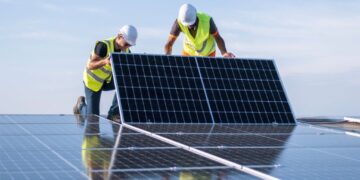Germany’s biggest power supplier E.ON wants smart homes to be smart business in a world of decentralized, low-carbon energy markets.
That’s why it teamed up this week with U.S. tech giant Microsoft to produce a digital dashboard of all the electrical devices in a home, from heating systems to solar panels to battery storage systems to electric cars.
Set to go on sale next year, E.ON’s home energy management system will be one of a range of products on offer from big German utility companies desperate to increase profits from their networks of millions of electricity and gas customers.
Faced with the prospect of flat earnings from just selling power, German utilities are offering products from smoke alarms, electronic door locks, EV charging kits, broadband and even the Amazon Prime delivery service to generate higher returns.
They’re also trying to get as many new customers as possible on board now to build brand loyalty for when complex smart homes become the norm rather than the exception – and need cutting-edge technology to run efficiently.
Since E.ON announced plans in March to merge with rival Innogy, it has stepped up a race with Vattenfall, EnBW and smaller utilities to persuade German customers to switch providers, offering signing bonuses such as iPads, washing machines or hundreds of euros in cash.
“The value of customers today is different from three to four years ago because customers have become more active,” said Victoria Ossadnik, chief executive of E.ON’s retail division Energie Deutschland.
A study by consultants McKinsey & Company www.mckinsey.com showed that pre-tax earnings before interest and taxes (EBIT) from downstream power activities in the European Union will grow by a third to 20 billion euros in the 10 years to 2025.
But none of the increase will come from classic power supply, said McKinsey’s Tiziano Bruno, one of the authors of the study here published in May.
Bruno said the increase will come from a 5 billion euro ($5.9 billion) rise in the value of energy efficiency services to 9 billion – and that’s why utility companies are set on ring-fencing customers now and coming up with new products.
Investors welcome the shift after years of underperformance by utilities when low wholesale power prices led to operational losses and fossil-fuel plants were driven out of the market by renewable energy in Germany’s drive towards low-carbon energy.























